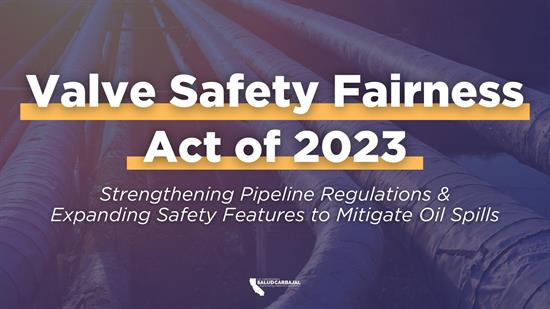Reps. Carbajal, Brownley Introduce Legislation to Strengthen U.S. Pipeline Safety Regulations, Expand Emergency Requirements Established after Refugio Oil SpillIn wake of 2015 oil spill on Central Coast, California lawmakers secured new federal rules mandating shut-off and detection technologies in new oil and gas pipelines, but a recent court decision rolled back safety feature requirements
Washington,
November 29, 2023
Tags:
Environment and Energy
Today, Congressman Salud Carbajal (CA-24) and Congresswoman Julia Brownley (CA-26) are introducing new legislation to expand the types of oil and gas pipelines in the United States that are required to install automatic shut-off valves and rupture detection technologies to mitigate devastating spills like the one that spilled over 100,000 gallons of oil on the Central Coast of California in 2015. In March 2022, the Pipeline and Hazardous Materials Safety Administration (PHMSA) followed through on a longtime push by California lawmakers to mandate these safety features on new and entirely replaced gas transmission lines, Type A gas gathering, and hazardous liquid (including carbon dioxide) pipelines. In May 2023, however, a U.S. district court limited application of this rule by striking down the safety feature requirements applying to Type A gas gathering lines–the pipelines that transport gas from a production facility or refinery to a transmission line or gas main. The bill introduced by Reps. Carbajal and Brownley today, the Valve Safety Fairness Act of 2023, would restore the requirement for Type A gas gathering line operators to install these safety technologies in compliance with the 2022 PHMSA rule. “While an automatic shutoff valve may not stop an oil spill from happening, it can mitigate some of the damage to our communities. I represent communities that have been directly impacted by oil spills,” Congressman Carbajal said. “Not only do they pollute our oceans and kill wildlife, but are also costly in clean-up costs and shuttered fisheries. Therefore, I am committed to preventing Big Oil’s use of judicial roadblocks to block the implementation of this critical technology across the communities where these pipelines threaten our environment and our neighborhoods. With oil and gas companies making more than $200 billion in profits last year alone, their attempts to avoid paying for the most basic safety features are an insult to the intelligence of the communities that I represent.” “Residents along California’s Central Coast know the dangerous impacts of oil spills all too well. That is why we must ensure that pipeline owners and operators are using the most advanced technology available to prevent leaks or spills. As a member of the House Transportation and Infrastructure Committee, I have worked to improve federal pipeline safety and oversight, and I look forward to continuing this work with Congressman Carbajal to advance critical legislation to close a safety loophole,” said Rep. Brownley. Both Carbajal and Brownley serve on the House Transportation and Infrastructure Committee. In 2015, the source of Plains All American Pipeline’s oil spill near Refugio Beach in Santa Barbara, which spilled over 100,000 gallons of crude oil into Central Coast beaches and ecosystems, took more than two hours to detect. Additional Background: After the spill, Congressman Carbajal led a push for new federal rules requiring automatic shut-off values and leak detection standards for oil and gas pipelines – initially through a measure which unanimously passed in the House in September 2017, and later through direct outreach by Carbajal and Senator Dianne Feinstein (D-CA) to PHMSA. PHMSA issued new rules in March 2022 mandating the installation of automatic and remote-control shut-off valves and leak detection technology for new pipelines. Congressman Carbajal has previously advocated for his colleagues on the House Transportation and Infrastructure Committee to support legislation that would expand the 2022 PHMSA rule to include all existing oil and gas pipelines. |
- Home
- About
- Services
- Help with a Federal Agency
- Congressional Art Competition
- Congressional App Challenge
- Congressional Commendations
- Congressional Women of the Year
- Flag Request
- FY2027 Appropriations Requests
- FY2027 National Defense Authorization Act Requests
- FY26 Community Projects
- Know your Immigration Rights
- Grants
- Internships
- Military Academy Nominations
- Tour Requests
- Issues
- Media
- Contact




